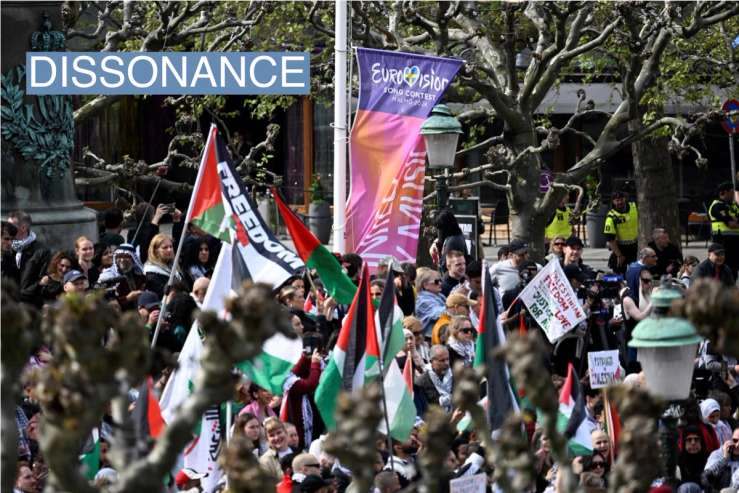The News
Thousands of demonstrators took to the streets of the Swedish city of Malmö on Thursday to protest Israel’s participation in the Eurovision Song Contest ahead of the final this weekend, with observers calling this year’s competition the most fraught in its history.
The once-unifying European event has been engulfed in controversy over Israel’s war in Gaza, with Israeli contestant Eden Golan forced to change her song’s title and lyrics following criticism that the song referenced the Oct. 7 Hamas attacks.
Several contestants have called for a ceasefire in Gaza, while a former Swedish contestant of Palestinian origin who opened the contest was rebuked by organizers for wearing a keffiyeh — considered a symbol of Palestinian liberation — around his wrist. And on Thursday a Finnish rapper who placed second in last year’s contest spoke out to clarify that a video clip of him dancing with Golan was “not a political statement.”
As police helicopters circled overhead, protesters in Sweden’s third-largest city chanted “Eurovision shame on you! Blood is on your hands, too!” as they called for Israel to be banned, the Washington Post reported.
While Golan’s participation has sparked a debate about Israel’s cultural and political association with Europe, others fear geopolitical tensions are blurring Eurovision’s historic mission of inclusivity and unity.
SIGNALS
Israel controversy mars years of cultural achievements
While Eurovision claims to be a purely cultural event, it is no stranger to geopolitical controversy, be it through “subtly political lyrics, boycotts, or the outright ban on Russia” over its war in Ukraine, NBC News said. But the contest — whose slogan is “United by Music” — has also been lauded for bringing Europe together after the fall of the Berlin Wall, offering a safe space for LGBTQ artists, and promoting female empowerment, columnist Hanna Fahl wrote for Swedish newspaper Dagens Nyheter. Those accomplishments are now at risk of being overshadowed by war and politics. “Because of Israel’s participation, the contest has become the symbolic centerpiece of a tornado of demonstrations, anger, polarization. Eurovision has survived a lot in its 68-year history, but will be marred by this,” she wrote.
Eurovision symbolizes Israel’s quest to align itself with Europe
Israel became the first non-European country to take part in Eurovision in 1973 and has won the contest four times — part of a broader push to build closer political and cultural ties with Europe. “We want to be part of Europe: This is our identity,” said one Israeli sociologist who studies Eurovision. Prime Minister Benjamin Netanyahu’s government has invested heavily in Israel’s arts and culture sector, and helped Israeli singers set up international tours, to showcase to foreign audiences an Israel that is “beyond the conflict [with Palestine],” according to researchers at Spain’s Comillas Pontifical University. However, that narrative has been shattered by Israel’s military campaign in Gaza.
US-style antiwar protests spread across Europe
US-style student protests demanding universities divest from Israel have also sprung up in European cities, with encampments at colleges from Amsterdam to Berlin and Dublin. European officials have shown a mixed response: UK Prime Minister Rishi Sunak said he supported students’ right to free speech but criticized encampments for disrupting learning. Students in Ireland, meanwhile, have found more success: Trinity College Dublin on Wednesday agreed to divest from Israeli firms, though student journalists believe a key factor was the university losing more than $377,000 in revenue after students blocked access to the Book of Kells, a medieval manuscript and popular tourist attraction on campus.



